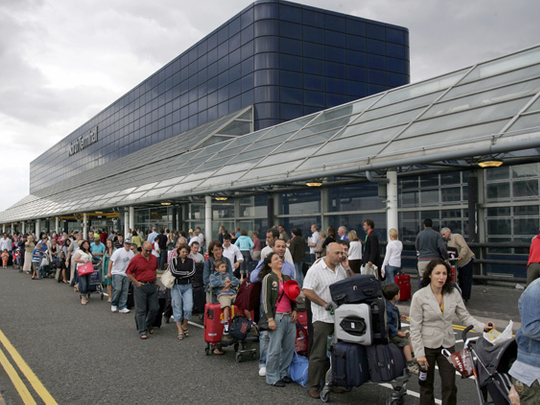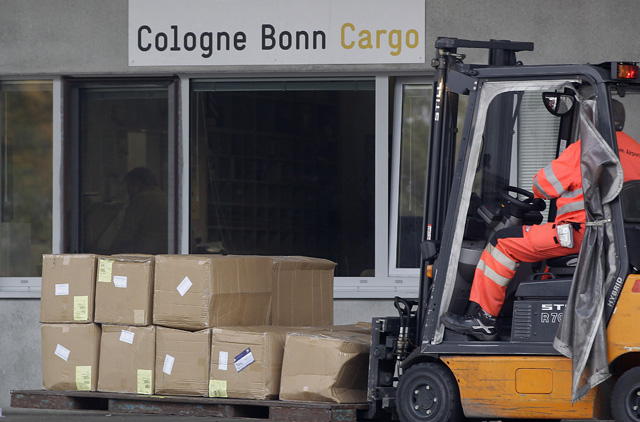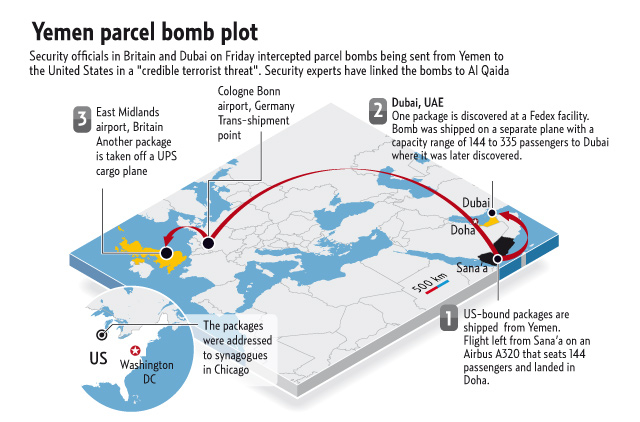
London: Governments, airlines and aviation authorities around the world were reviewing security on Monday after US-bound parcel bombs sent by air from Yemen were intercepted in Dubai and Britain.
In London, Prime Minister David Cameron convened a crisis committee to decide Britain’s response after one of the packages was found on a United Parcel Service cargo plane at East Midlands Airport, north of London, on Friday.
The other bomb was discovered in a computer printer cartridge in a parcel at a FedEx facility in Dubai. The findings disclosed what appeared to be a loophole in air cargo security that put passengers' lives at risk.
Germany’s aviation authority meanwhile said the country has extended its ban on cargo aircraft from Yemen to include passenger flights amid the current terrorist threat.
A German security official says the mail bombs intercepted last week contained 300 grams and 400 grams of the explosive PETN.
The official, who briefed reporters in Berlin on condition of anonymity in line with department guidelines, said Monday that if the bombs had gone off "the explosive effect would have been significant."
One of the bombs that was mailed from Yemen and found by authorities was routed to London through the UPS hub in Cologne.
German aviation agency spokeswoman Cornelia Cramer said Monday that passenger flights from Yemen were being suspended until further notice.
Yemenia spokesman Eugene Lopez says the airline flies Tuesdays and Saturdays from San'a to Frankfurt.
Germany stopped package deliveries from Yemen over the weekend.
“Air freight is still considered to be the soft underbelly of the aviation industry,” aviation security expert Chris Yates told BBC television. Qatar Airways confirmed the Dubai parcel had been transported on its passenger planes from Sana’a via Doha.
Nigeria said it would inspect all cargo heading for the United States with scanners for detecting explosives, in addition to its normal X-ray screening procedures.
Cameron said on Saturday the bomb found in Britain was designed to blow an aircraft out of the sky.
The plot could fuel calls for the wider use of imaging technology designed to detect explosives, which is not standard, but freight firms are reluctant to bear the full cost.
Tighter international air cargo security rules could deal a blow to trade and the world economy. Freight firms clashed with US and European policy makers last year over calls for 100 percent scanning of sea containers. Plans to introduce full scanning from 2012 were postponed.
British interior minister Theresa May, who was due to brief parliament on the bomb plot later on Monday, said on Sunday security around all international air cargo arriving in Britain would be reviewed.
Britain said it had immediately halted the movement of air freight from Yemen into or through Britain, including cargo brought in on indirect flights from the country. Direct flights from Yemen to Britain had already been suspended.
Michael O’Leary, chief executive of Europe’s largest budget airline Ryanair called for a common sense response, saying imposing further security restrictions on passengers would be ineffective.
"We've had ludicrous regulations in the past couple of years where we are confiscating women's lipsticks and bottles of water over 100 ml, making people take their shoes off. It has no effect on security whatsoever," he told BBC television.
Restrictions on the carrying of liquids on planes were introduced in 2006 after the discovery of an al Qaeda-inspired plot to blow up transatlantic flights with explosive materials concealed as soft drinks.















